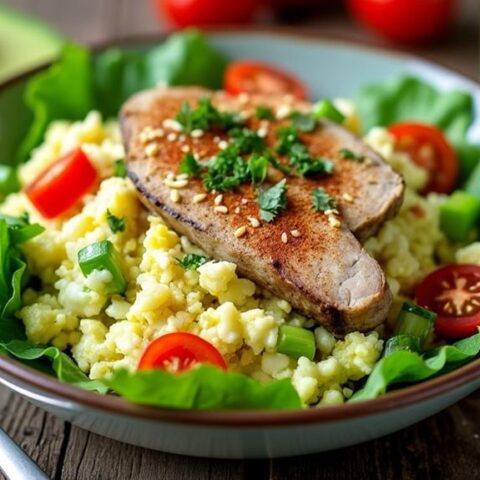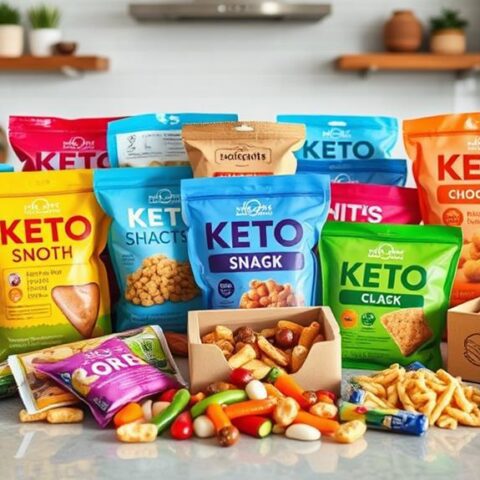
Spiced rum is a low-carb beverage option, typically containing between 0.5 to 0.7 grams of net carbs per 1.5 fl oz serving. This minimal carbohydrate content makes it compatible with low-carb and ketogenic diets, as seen in brands like Captain Morgan's Original Spiced Rum and Bacardi Spiced Rum. However, consumption should be moderate, as alcohol metabolism can temporarily shift energy use from fats to alcohol, potentially affecting ketosis. Additionally, the caloric content of spiced rum can be greatly influenced by mixer choices, which might impact dietary goals. Investigating preferred brands and mixers can further inform health-conscious choices.
Key Takeaways
- Spiced rum contains 0.5 to 0.7 grams of net carbs per 1.5 fl oz serving.
- Captain Morgan's and Bacardi Spiced Rum have approximately 0.5 grams of net carbs per serving.
- Parrot Bay Coconut Rum is higher in carbs, with 9.2 grams per 40 ml serving.
- Low-carb spiced rums are suitable for ketogenic diets due to minimal carbohydrate content.
- Mixing with low-calorie options like Diet Coke minimizes additional carbohydrate intake.
Understanding Carbohydrate Content
Understanding the carbohydrate content of spiced rum is essential for individuals adhering to low-carbohydrate or ketogenic diets. Spiced rums generally exhibit low carbohydrate levels, with approximately 0.5 to 0.7 grams of net carbs per 1.5 fl oz serving. This modest carbohydrate presence is due to the residual sugars incorporated during the flavoring process.
However, these levels are considerably lower compared to other alcoholic beverages, making spiced rum a viable option for those monitoring their carbohydrate intake.
Captain Morgan's Original Spiced Rum, a popular choice among consumers, contains about 0.5 grams of net carbs per 1.5 fl oz serving. This minimal carbohydrate content allows individuals on low-carb diets to enjoy spiced rum without drastically affecting their daily carb limits. When consumed neat or with low-calorie mixers, spiced rum contributes minimally to overall carbohydrate consumption.
Despite its low carb content, it is important to recognize that spiced rum, like other alcoholic beverages, can influence ketosis due to its alcohol content. As a result, moderate consumption is advised for those on ketogenic diets to maintain ideal metabolic states.
Understanding these nuances enables informed dietary decisions while enjoying spiced rum responsibly.
Popular Spiced Rum Brands
Exploring popular spiced rum brands reveals a range of options that align with low-carbohydrate dietary preferences. These beverages typically contain minimal net carbs per serving, appealing to health-conscious consumers.
Captain Morgan, a well-known brand, offers its Original Spiced Rum with approximately 0.5 grams of net carbs per 1.5 fl oz serving. This characteristic makes it an attractive choice for those monitoring carbohydrate intake.
Other brands that maintain a similar nutritional profile include Bacardi Spiced Rum, which also contains about 0.5 grams of net carbs per 1.5 fl oz. This consistency in carbohydrate content across brands indicates a trend towards accommodating low-carb diets.
Additionally, Cutwater Spirits Three Sheets Spiced Rum provides the same net carb content with a caloric presence of 100 calories per serving.
The list of low-carb spiced rums further includes:
- Burnetts Spiced Rum: 0.5 grams of net carbs per 1.5 fl oz
- Corsair Spiced Rum: Emphasizes suitability for low-carb diets with 0.5 grams of net carbs
- Captain Morgan Black Spiced Rum: Maintains 0.5 grams of net carbs and 118 calories
These selections offer a versatile approach to enjoying spiced rum while adhering to dietary goals.
Keto-Friendly Options
When considering keto-friendly options, spiced rums emerge as a viable choice due to their low carbohydrate content, which typically ranges from 0.5 to 0.7 grams per 1.5 fl oz serving.
Well-known brands like Captain Morgan and Bacardi cater to individuals following a low-carb regimen due to their minimal net carbohydrate levels. This makes them suitable for those adhering to a ketogenic diet, where maintaining low carbohydrate intake is essential.
The absence of sugars in these beverages further enhances their compatibility with ketogenic dietary principles. However, consumers must be cautious about the alcohol content, which, while not contributing carbohydrates, can impact caloric intake and metabolic health.
Furthermore, excessive consumption may impede ketosis, the metabolic state important for ketogenic success. Other brands, such as Cutwater Spirits and Corsair, also offer spiced rums with similar low carbohydrate profiles. These products typically contain around 100-125 calories per serving.
To guarantee that a spiced rum remains a keto-friendly option, selecting appropriate mixers is critical. Opting for diet sodas or low-calorie alternatives can prevent additional carbohydrate intake, aligning with the dietary goals of ketogenic adherents.
Caloric Insights
The caloric content of spiced rum is primarily attributed to its alcohol content, with each gram of alcohol providing approximately 7 calories.
While the carbohydrate content in spiced rums is minimal, typically around 0.4g per serving, the inclusion of mixers can greatly alter the caloric profile of a drink.
Health-conscious consumers should be mindful of mixer choices, as sugary additives can considerably increase overall calorie intake and impact metabolic health.
Alcohol-Derived Calorie Sources
A glass of spiced rum is more than just a flavorful indulgence; it is a concentrated source of alcohol-derived calories that demand attention for their impact on dietary considerations. The vast majority of these calories emanate from alcohol itself, with approximately 7 calories per gram contributing to the total caloric content.
For instance, Captain Morgan Original Spiced Rum demonstrates how alcohol-derived calorie sources prevail, with roughly 86 calories per 1.5 fl oz shot, and minimal carbohydrates—often between 0 to 0.7 grams per serving. This low carbohydrate content aligns with the needs of those monitoring their carb intake, such as individuals on ketogenic diets.
However, it's important to recognize that these calories are mainly 'empty,' lacking essential nutrients despite their energy provision.
When considering spiced rum as part of a diet, it's essential to weigh these factors:
- Carbs in Captain Morgan: Minimal, supporting low-carb dietary goals.
- Caloric contribution: Primarily from alcohol, not carbohydrates.
- Nutritional value: Low, as spiced rum offers negligible vitamins or minerals.
- Dietary impact: Suitable for low-carb diets but requires moderation to maintain dietary balance.
Understanding these elements aids in making informed decisions about alcohol consumption.
Impact of Mixer Choices
While spiced rum itself contributes minimal carbohydrates and offers a straightforward caloric profile, the choice of mixers can greatly alter the nutritional landscape of your drink.
Utilizing regular Coke as a mixer with Captain Morgan Spiced Rum, for instance, can result in an additional 594 calories, considerably increasing the overall caloric content of your beverage. This highlights the impact high-calorie mixers can have, often overshadowing the 86 calories found in a standard serving of spiced rum.
Conversely, opting for low-calorie mixers such as Diet Coke or Coke Zero drastically reduces the caloric addition, with each contributing just 1 calorie or none, respectively.
This choice not only aligns with calorie-conscious goals but also mitigates the intake of hidden sugars prevalent in regular sodas. Awareness of these elements is essential for individuals aiming to manage their dietary intake while enjoying alcoholic beverages.
Impact on Ketosis
Steering through the effects of spiced rum on ketosis requires an understanding of both its carbohydrate content and how alcohol metabolism interacts with fat metabolism. Spiced rum, containing approximately 0.5 to 0.7 grams of net carbohydrates per 1.5 fl oz serving, is a low-carb option suitable for ketogenic diets.
However, the interplay between alcohol and ketosis is complex. Although the carbohydrate content from residual sugars is minimal, alcohol metabolism can temporarily hinder ketosis by shifting the body's energy-burning focus from fats to alcohol.
It's important to note that during the initial adaptation phase of a ketogenic diet, individuals may experience fatigue and performance dips, which could be exacerbated by alcohol consumption.
To navigate the consumption of spiced rum without disrupting ketosis, consider these factors:
- Moderation is Key: Excessive intake of spiced rum can increase calorie consumption, potentially hindering weight loss goals.
- Monitor Carbohydrate Intake: Keep track of overall carbohydrate intake from both the rum and accompanying mixers or food.
- Temporary Disruption: Understand that alcohol prioritization in metabolism might pause ketosis, but moderate consumption should not have a lasting impact.
- Weight Goals: Be mindful of the caloric content, as overconsumption can affect weight loss efforts despite low carbohydrate content.
Comparing Rum and Mixers
When considering the carbohydrate content of spiced rum, it is essential to compare the impact of various mixers on the overall nutritional profile of a beverage.
While spiced rums like Captain Morgan Original Spiced Rum contain minimal carbohydrates, the addition of high-calorie mixers such as regular Coke can greatly increase the calorie and carbohydrate content of the drink.
For individuals aiming to maintain a low-carbohydrate intake, opting for mixers like Diet Coke or Coke Zero, which provide negligible calories, can help align their choices with dietary guidelines.
Rum Varieties Compared
Spiced rum varieties present a diverse range of carbohydrate contents, essential for those adhering to low-carb diets. Among the popular selections, Captain Morgan Original Spiced rum stands out with its 0 grams of total carbs, rendering it an excellent choice for those minimizing carbohydrate intake. This aligns with the other offerings from Captain Morgan, such as their White and Spiced Gold varieties, which also maintain a zero-carbohydrate profile.
When comparing other options, Bacardi Spiced Rum presents a slightly higher carb content, with 0.5 grams of net carbs per 1.5 fl oz serving. This is marginally significant but remains a low-carb alternative when compared to traditional mixers.
Similarly, Captain Morgan's Black Spiced Rum and 100 Proof variant each contain 0.5 grams of net carbs, with caloric content varying between 118 and 125 calories per serving.
Conversely, Parrot Bay Coconut Rum diverges from the low-carb trend, containing 9.2 grams of carbohydrates per 40 ml serving, which is remarkable for those strictly monitoring their carb intake.
- Captain Morgan Original Spiced: 0 grams total carbs
- Bacardi Spiced Rum: 0.5 grams net carbs per serving
- Captain Morgan Black Spiced: 0.5 grams net carbs, 118 calories
- Parrot Bay Coconut Rum: 9.2 grams carbs per 40 ml serving
Mixer Caloric Impact
In evaluating the caloric impact of rum cocktails, the choice of mixer plays a pivotal role. Spiced rum, inherently low in carbohydrates with approximately 0.5 to 0.7 grams per 1.5 fl oz, can see its caloric content noticeably altered by the mixer. For instance, when paired with regular Coke, a 330-milliliter serving introduces approximately 594 additional calories. This combination inflates the overall caloric intake considerably, given that a shot of spiced rum contains about 86 to 122 calories.
The mixer caloric impact, therefore, becomes a critical factor for individuals monitoring their calorie consumption. Conversely, opting for Diet Coke or Coke Zero reduces this impact significantly, as these alternatives contribute negligible calories (1 and 0 respectively) to the cocktail.
This highlights the importance of selecting low-calorie mixers for those seeking to minimize their caloric intake. While the calories from spiced rum mainly derive from alcohol—1 gram of which provides around 7 calories—the awareness of hidden sugars in mixers is essential.
Health-conscious consumers must consider these factors to maintain a balanced intake while enjoying the flavor complexities of spiced rum without the excess caloric burden.
Low-Carb Choices
Examining the nutritional profile of spiced rum cocktails, the impact of mixers is clearly significant, especially for those adhering to low-carb diets. Spiced rum, such as Captain Morgan or Bacardi, is inherently low in carbohydrates, containing approximately 0.5 to 0.7 grams per 1.5 fl oz serving. This makes it an ideal choice for low-carb enthusiasts.
However, the choice of mixer can dramatically alter the drink's carbohydrate content. For instance, mixing spiced rum with regular soda, like Coke, can introduce an additional 594 calories and considerable carbohydrates, undermining the low-carb nature of the rum.
To maintain a low-carb profile while enjoying spiced rum, consider the following mixer alternatives:
- Diet Coke: Offers a low-calorie option with just 1 gram of carbohydrates per serving.
- Coke Zero: Provides a zero-carb alternative to regular soda, preserving the low-carb integrity of the cocktail.
- Neat or on the rocks: Enjoying spiced rum without mixers eliminates additional carbs entirely.
- Soda water: A zero-calorie, no-carb option that adds fizz without compromising carb intake.
These choices enable those on low-carb or keto diets to enjoy spiced rum without disrupting their nutritional goals.
Tips for Low-Carb Drinking
Maneuvering the world of low-carb drinking can be straightforward with the right strategies. For individuals adhering to low-carb diets, selecting spiced rums like Captain Morgan Original, Bacardi Spiced, or Cutwater Spirits Three Sheets, which contain approximately 0.5g net carbs per serving, is prudent. These options align well with dietary goals while allowing the enjoyment of flavored spirits.
Additionally, the keto diet emphasizes the importance of maintaining stable blood sugar levels, making low-carb alcoholic options particularly advantageous. However, moderation remains paramount; the USDA guidelines advise limiting alcohol intake to one drink per day for women and two for men, which aids in managing calorie consumption effectively.
When crafting mixed drinks, careful consideration of mixers is essential. Regular sodas, such as Coke, can contribute considerably to both calorie (594 calories per 330 ml) and sugar intake, potentially derailing low-carb efforts.
Opting for diet sodas or other low-calorie alternatives can mitigate this risk, maintaining the integrity of a low-carb regimen. Additionally, exploring spiced rums with higher proof, such as Captain Morgan 100 Proof, can offer robust flavor with reduced volume, thereby minimizing calorie intake.
Frequently Asked Questions
Is Spiced Rum High in Carbs?
Spiced rum generally exhibits low carbohydrate content, approximately 0.5 grams per 1.5 fl oz serving. Despite its rich flavor profile, its caloric content remains modest, rendering it compatible with low-carb dietary regimens focused on health-conscious alcohol consumption.
Is Spiced Rum Allowed on Keto Diet?
Spiced rum, as a keto-friendly spirit, can be consumed in moderation within a ketogenic diet, particularly when paired with low carb mixers. Its minimal carbohydrate content supports maintaining ketosis, although excessive intake may disrupt metabolic goals.
Is Spiced Rum Full of Sugar?
Spiced rum ingredients typically include flavorings rather than sugars, resulting in negligible sugar content. Prominent spiced rum brands, including Captain Morgan and Bacardi, report minimal sugars, making them suitable for low-sugar diets while retaining characteristic sweetness from added flavors.
What Rum Has No Sugar or Carbs?
Spiced rum brands such as Captain Morgan and Bacardi offer products with minimal carbs and no sugar. The fermentation process in these rums, coupled with careful ingredient selection, guarantees low-carb content, making them suitable for health-conscious consumers.
Conclusion
The carbohydrate content in spiced rum varies across brands, influencing its suitability for low-carb or ketogenic diets. Understanding these variations is essential for those monitoring carbohydrate intake. While some spiced rums may offer keto-friendly options, consumers should be aware of the caloric contribution and potential impact on ketosis. Additionally, mixers can greatly alter the carbohydrate profile of a drink. As a result, selecting low-carb alternatives and being mindful of mixers can facilitate healthier drinking choices within a low-carb dietary framework.










No Comments